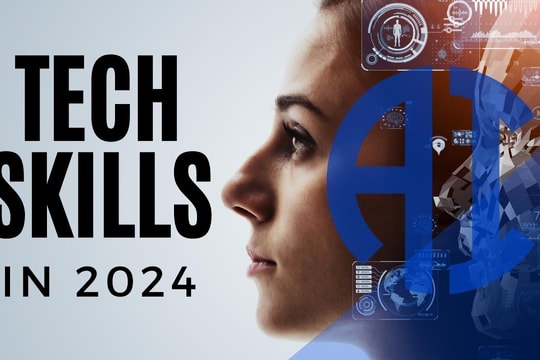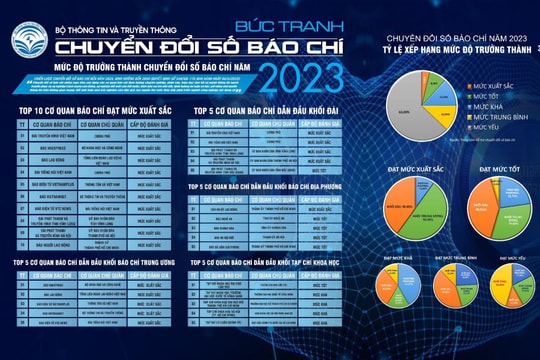Top 5 Artificial Intelligence Trends in 2024
(Baonghean.vn) - Artificial intelligence (AI) is becoming a powerful force of change in many areas of life, from manufacturing to healthcare. In 2024, AI is expected to continue to grow strongly and have a profound impact on the global economy.
In 2023, AI has become the dominant topic of technology conversation in the corporate world worldwide. There is now no industry where AI cannot make its mark. From financial services to healthcare to travel, AI is fast becoming an integral part of business planning and growth strategies for organizations.
According to a report by IDC, in the Asia-Pacific region alone, AI spending is expected to skyrocket to $78.4 billion by 2027. This increase reflects the trend of leveraging advanced technology to redesign operations, enhance customer experience and maintain competitive advantage in a rapidly changing market. IDC forecasts a compound annual growth rate (CAGR) of up to 25.5% for the period 2022-2027.
For companies like IBM, the focus in 2024 will be on helping businesses maximize the benefits of adopting and transforming AI. IBM predicts exponential growth in AI, up to 3.5 times higher by 2025. To achieve this, the tech giant believes there are five trends that will have a strong impact on organizations in 2024.
Organizations transition from “plus AI” to “AI plus”
The first prominent AI trend that IBM predicts for 2024 is the shift of organizations from “plus AI” to “AI plus.” AI plus is a term coined by IBM to describe how organizations should design applications and services with AI as a foundation from the beginning, instead of adding AI (plus AI) to existing systems later. This means that organizations need to consider AI from the beginning of the development process and integrate it seamlessly into the entire business process.
There are several advantages to adopting AI plus. First, it can help organizations create more efficient and innovative applications and services. Second, it can help organizations save time and money in the long run. Third, it can help organizations create better customer experiences.
IBM believes that AI plus is the key to future organizational success. The company predicts that 70% of applications will be built with AI as a foundation by 2030.
An IBM survey found that three-quarters of CEOs believe that competitive advantage depends on who has the most advanced generative AI technology. Yet, in reality, more than 60% of organizations have yet to develop a comprehensive, coherent strategy for the adoption of generative AI – a critical step toward building a trustworthy and responsible AI platform.
IBM’s research also found that two-thirds of CEOs are operating without a clear plan for how to support their workforce through the inevitable disruption and change brought by AI. Less than one-third of CEOs have even assessed the potential impact of generative AI on their workforce, meaning they may not know what to tell their employees.
In this regard, Ms. Catherine Lian, Managing Director and Chief Technology Officer of IBM Malaysia, emphasized: “To lead with responsible AI, executives and their organizations need to promote the best human values including intelligence, ethics and concern for stakeholders.”
Those who use AI will replace those who do not use AI.
Despite the popular belief that AI will replace the workforce, in reality, it will not be technology that will be replaced, but people who know how to use technology more effectively.
For example, in most organizations, human resources are often the first to adopt AI. Employees who don’t know how to work with this technology will simply be replaced by those who can. And those who can are the ones who reskill.
“Successful AI adoption depends on teams embracing new AI tools and applications. CEOs estimate that 40% of the workforce will need to be reskilled in the implementation of AI and automation in the next three years. Currently, with limited visibility, 87% of CEOs expect job roles to be augmented, not replaced, by AI. To succeed, workers need to trust their new AI partners,” Catherine Lian added.
Requires leaders to be more deeply involved in data discussions, beyond the confines of the IT department
C-Level executives want to understand how to leverage data to deliver better customer experiences and build a business that uses technology effectively.
However, this path is not easy, especially when it comes to data security. 47% of CEOs admit that the more technology, the greater the cybersecurity risk for the organization. Therefore, the budget for cybersecurity investment, especially data security for AI, will certainly increase.
“Trust in your data is more important than ever, not just for the integrity of the data itself, but also for the security of all data running on your virtual systems,” said Catherine Lian. “Organizations that can effectively harness trusted, high-quality data see twice the ROI from AI capabilities compared to their competitors. With such a large potential return, it’s no surprise that by 2024, data will no longer be just a technology issue, but a critical strategic business responsibility.”
Flexible operating model
This is a model that can adapt flexibly to unpredictable market changes. This is achieved by building a flexible operating model that can be adjusted over time, without rigid stereotypes; training AI models to analyze unstructured external data to find hidden patterns in a huge sea of information, while combining internal patterns and organizational management principles to ensure logic and efficiency in operation.
These factors help businesses stay resilient to market shocks and respond almost instantly. By 2024, management platforms powered by generative AI will become more sophisticated, providing the ability to monitor and respond quickly to a growing range of risks.
Ecosystem is strategy, not just part of strategy
Building trust with customers is key, and in that context, ecosystems can be a partner or a hindrance. By 2024, ecosystems will move beyond the old form where separate entities collaborate loosely to achieve similar goals. Instead, ecosystem participation will be key to revenue growth.
The foundation of the ecosystem game is open innovation: leading open innovation companies have achieved 59% higher revenue growth than their competitors. However, to be successful, data must flow securely and freely throughout the ecosystem.
In summary, as leaders navigate future challenges and uncertainties, they need to proactively embrace these five trends, which will shape the business landscape in 2024 and beyond, building on a solid foundation of trust for success.






